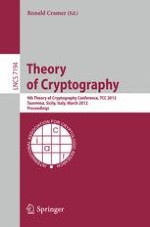2012 | OriginalPaper | Buchkapitel
On the Instantiability of Hash-and-Sign RSA Signatures
verfasst von : Yevgeniy Dodis, Iftach Haitner, Aris Tentes
Erschienen in: Theory of Cryptography
Verlag: Springer Berlin Heidelberg
Aktivieren Sie unsere intelligente Suche, um passende Fachinhalte oder Patente zu finden.
Wählen Sie Textabschnitte aus um mit Künstlicher Intelligenz passenden Patente zu finden. powered by
Markieren Sie Textabschnitte, um KI-gestützt weitere passende Inhalte zu finden. powered by
The hash-and-sign RSA signature is one of the most elegant and well known signatures schemes, extensively used in a wide variety of cryptographic applications. Unfortunately, the only existing analysis of this popular signature scheme is in the random oracle model, where the resulting idealized signature is known as the RSA
Full Domain Hash
signature scheme (RSA-FDH). In fact, prior work has shown several “uninstantiability” results for various abstractions of RSA-FDH, where the RSA function was replaced by a family of trapdoor random permutations, or the hash function instantiating the random oracle could not be keyed. These abstractions, however, do not allow the reduction and the hash function instantiation to use the algebraic properties of RSA function, such as the multiplicative group structure of ℤ
n
* . n. In contrast, the multiplicative property of the RSA function is critically used in many standard model analyses of various RSA-based schemes.
Motivated by closing this gap, we consider the setting where the RSA function representation is generic (i.e., black-box)
but multiplicative
, whereas the hash function itself is in the standard model, and can be keyed and exploit the multiplicative properties of the RSA function. This setting abstracts all known techniques for designing provably secure RSA-based signatures in the standard model, and aims to address the main limitations of prior uninstantiability results. Unfortunately, we show that it is still impossible to reduce the security of RSA-FDH to any natural assumption even in our model. Thus, our result suggests that in order to prove the security of a given instantiation of RSA-FDH, one should use a non-black box security proof, or use specific properties of the RSA group that are not captured by its multiplicative structure alone. We complement our negative result with a positive result, showing that the RSA-FDH signatures can be proven secure under the
standard
RSA assumption, provided that the number of signing queries is
a-priori bounded
.
